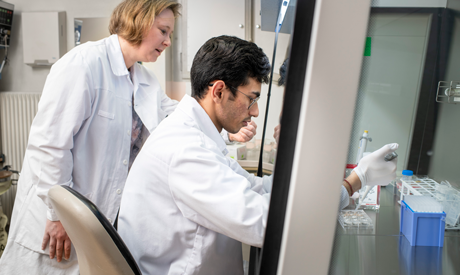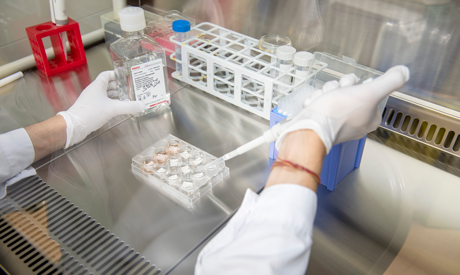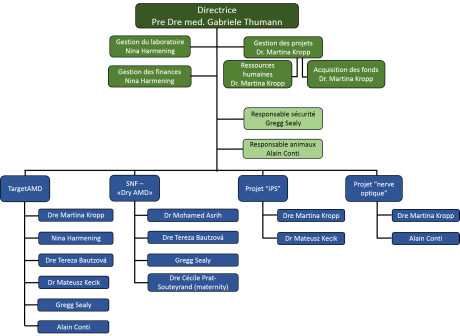

The experimental ophthalmology section is a centre for research and teaching with the principal objective of optimising the treatment of retinal diseases such as age-related macular degeneration (AMD) and diabetic retinopathy. Our interest is the promotion of regenerative and personalized medicine such as the development of cell-based, GMP compliant Advanced Therapy Medicinal Products (ATMP) to treat neurodegenerative diseases of the eye. To that purpose, we are using regenerative gene therapeutic modalities, such as transplantation of genetically modified cells and induced pluripotent stem (iPS) cells and we are working on new biomaterials and drug application systems. Currently, our research efforts involve the following projects.
TargetAMD
The purpose of the project is the development of a cell-based, personalized gene therapeutic treatment for neovascular AMD, which will suppress vessel growth and regenerate retinal architecture. The project comprises a number of steps, each of which was developed and validated. Specifically, IPE cells isolated from an iris biopsy are prepared in a GMP-facility. Using the Sleeping Beauty transposon system they are modified genetically by the addition of the PEDF gene to the cell’s genome by and transplanted subretinally in the same patient within a single surgical session. We have shown that all the steps are feasible, safe and effective at suppressing new vessel growth in vitro and in vivo. We are waiting for approval by the Swiss authorities to transfer the technology to human patients in 2017. The project is coordinated by Prof. G. Thumann and funded by the "European Union’s Seventh Framework Programme for research, technological development and demonstration” under the grant agreement no. 305134. Visit www.targetamd.eu.
Transposon based gene cell therapy in the treatment of dry macular degeneration
Atrophic AMD is the loss of retinal pigment epithelial (RPE) cells without the involvement of new blood vessels. Evolving the non-viral gene therapeutic approach developed in TargetAMD, we are actively working on the transplantation of cells that have been genetically modified to continuously provide neuroprotective growth factors to the retina, which would then prevent further loss of and regeneration of the RPE. After in vitro proof of concept studies, in vivo models should show the benefit and safety of the treatment. The project is funded by the FNS.
iPS-cell therapy to treat atrophic AMD
In collaboration with Prof. Z. Izsvák, MDC, and Prof. L. Scapozza, UNIGE, we are investigating whether the transplantation of genetically modified iPS-derived RPE cells will be effective at preventing further loss of RPE cells in an in vivo model of atrophic AMD. The transplanted iPS-derived RPE cells should re-establish a neuroprotective retinal environment and replace the degenerated RPE. Restoration of vision will be analyzed by functional, behavioral, cellular and molecular methods.
Restauration of vision by stimulation of the optic nerve by self-opening, intra-neural electrodes
In collaboration with Prof. D. Ghezzi, EPFL, we have established an in vivo model for the implantation of intra-neural electrodes that allow stimulation of the optic nerve and the recording of its electrophysiological activity; integrity of the optic nerve is determined by histological analysis.
Other research interests
They include the development of in-process quality controls for ATMPs using Raman spectroscopy in collaboration with CellTool GmbH; the analysis of the neuroprotective activity of Scutellarine and the toxicity of Decaline on the neural retina; the measure of the role of Lysyl Oxydase (LOX) in diabetic retinopathy. Our clinical research comprises the transfer of therapeutic approaches developed in our laboratories into the clinic and clinical trials for new drugs and innovative surgical procedures.
Organigram

